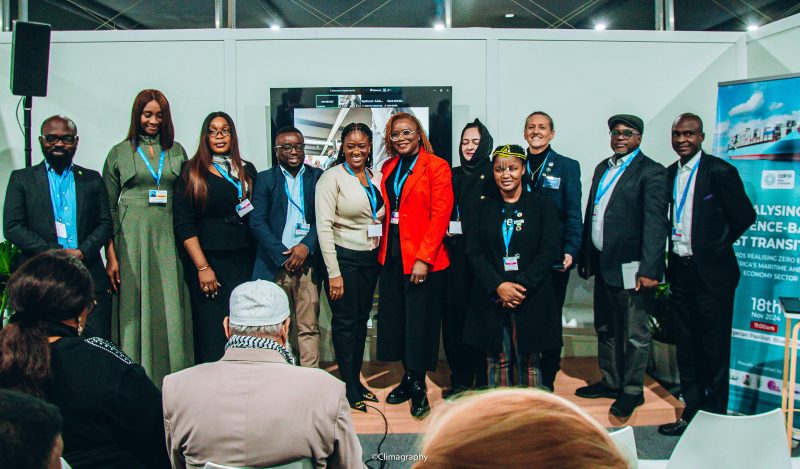As part of the ongoing UNFCCC Climate Change Conference (COP29) hosted by the government of Azerbaijan in Baku, a multisectoral group of experts have articulated a clear vision for a greener Africa, leveraging hydrogen as an energy alternative.

These insights were shared on Monday, November 18, 2024, during a two-part panel session titled “Catalysing an Evidence-Based Just Transition: Towards Realising Zero Emissions in Africa’s Maritime and Blue Economy Sector.”
The session featured international experts focused on African solutions, including Prof. Bamidele Adebisi from Manchester Metropolitan University, Mr. Maarten Ooms from the Green Climate Fund, Ms. Amna Awan of Centre of Pakistan and International Relations (COPAIR), Ms. Winfrida Shonde of TEEMO, Tanzania, Ms. Maria Ogbugo, an Associate of Maritime Africa, Mr. Michael Mbaru of the Kenya Maritime Authority, and Dr. Oma Ofodile of the Nigerian Maritime Administration and Safety Agency (NIMASA).
Africa’s maritime sector currently faces several challenges, such as aging vessels, inadequate infrastructure, and limited ownership of shipping fleets – only about 2% of the global shipping fleet is owned by African nations, despite the continent being coastal with hundreds of ports. This issue is linked to Africa’s economic situation, given that over 90% of the continent’s trade relies on international shipping.
Opening the session, Dr. Dolapo Oluteye, principal investigator of the Leading Effective Afrocentric Participation (LEAP) Project and moderator of the session, pointed to the International Maritime Organisation’s (IMO) ambitious goals for decarbonising international shipping.
“IMO’s contribution to the global fight against climate change in support of the United Nations Sustainable Goal 13, has led the organisation to set ambitious targets with milestones for 2030, 2040, and 2050 to reduce GHG emissions,” explained Dr. Oluteye.
Highlighting the gap between Africa’s realities and global green transition policies, Dr. Oluteye expressed that, “in the midst of a plethora of related regulatory pressures, African nations contend with energy poverty, food insecurity, social economic barriers, limited access to advanced technologies, expertise and constraints on financial resources, limiting the ability to engage effectively and efficiently with the energy transition drive to zero emission shipping.”
Professor Bamidele Adebisi, a Director at the African Hydrogen Partnership, discussed the potential of hydrogen to promote sustainability in Africa.
He stated, “Hydrogen comprises about 70% of the universe and can serve as a renewable energy source. It also presents an attractive alternative for maritime transport. Beyond production or generation of electricity, hydrogen is also a product for making ammonia, fertilisers, and other valuable substances.”
Speaking about available financial mechanisms, Mr. Maarten Ooms from the Green Climate Fund (GCF) explains that supporting developing countries to make the paradigm shift towards climate resilience is one of the GCF’s missions.
“Till date, we have invested $16 billion, across 133 countries and over 286 projects. In the context of transport, over the last 10 years, we have invested $1.2 billion over 27 projects. Our strategy is underpinned by three pillars: one is to make transport climate resilient, the second is creating social economic benefits, and the third, is decarbonising the sector.”
Additionally, Professor Adebisi urged Africa to seize the moment and accelerate its readiness to explore greener energy sources. “This is the moment for Africa. While we may not be where we want to be in terms of energy access, that doesn’t mean we must rely solely on fossil fuels to meet our energy needs. We have the potential to leapfrog and industrialise through greener alternatives.”
The experts collectively emphasised that with appropriate policies and infrastructure, Africa has the potential to harness its renewable energy resources, particularly hydrogen, to enhance its maritime capabilities and establish itself as a leader in the global transition to green energy.
By ‘Seyifunmi Adebote, seyi@climatetalkpodcast.com (Environmental Communicator and Host, Climate Talk Podcast)
